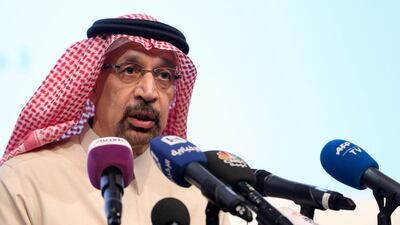Saudi Arabia said Houthi rebel drone attacks targeted two sections of its oil infrastructure on Tuesday, calling it a "cowardly" act of terrorism.
The kingdom's Energy Minister Khalid Al Falih said the attacks caused a fire but no injuries or disruption to oil production at the two pumping stations and pipeline between Eastern and Yanbu provinces.
The sites were attacked by drones carrying explosives, the minister said, threatening global oil supplies.
The attack took place between 6am and 6.30am local time on Tuesday morning but caused limited damage to the installations.
The UAE Ministry for Foreign Affairs condemned the attack, saying it was "new proof of the Houthis' hostile and terrorist tendencies".
On Tuesday morning, Houthi-run TV said the Yemeni rebels had carried out a "big military operation" using drones against seven Saudi installations.
They did not identify the targets and it remains unclear if those attacks were the same ones addressed by Riyadh.
Saudi Aramco, the kingdom's national oil company, confirmed no one was killed in the attacks.
Production and export of crude oil will continue uninterrupted, but pumping in the targeted pipeline was stopped temporarily, Mr Al Falih said.
Brent oil prices rose about 0.9 per cent after the announcement to $71.13 a barrel at 3.14pm UAE time.
"Saudi Aramco responded to a fire at East West Pipeline Pump station 8 that was caused by a sabotage incident using armed drones, which targeted pump stations 8 and 9," said the company, which is the world's biggest oil exporter.
"As a precautionary measure, the company temporarily shut down the pipeline and contained the fire, which caused minor damage to pump station 8.
"Saudi Aramco confirms that no injuries or fatalities have been reported. Saudi Aramco’s oil and gas supplies have not been impacted as a result of this incident."
The East-West pipeline runs from the oil refineries in the Eastern Province to the Yanbu port on the Red Sea.
It was built during the Iran-Iraq war during the early 1980s but was later converted to natural gas. In 2012, it was converted for oil.
It is a part of a collection of pipelines providing an alternative to the Strait of Hormuz.
Mr Al Falih also condemned the recent attack on four tankers in the Arabian Gulf off the coast of the UAE on Sunday night.
The UAE said it stood in solidarity with Saudi Arabia and that the security of the two countries was indivisible.
Houthi spokesman Mohamed Abdel Salam threatened further attacks on Saudi Arabia and said its forces had not ruled out the attacks on the UAE.
Bahrain's Foreign Ministry "strongly condemned" the attack, calling it a cowardly threat to the safety of the world's energy supply.
Jordan joined the condemnation. The Foreign Ministry said that it stood with "Saudi Arabia in the face of any threat".
On Sunday night four oil tankers – two Saudi, one UAE-registered, and one Norwegian-registered – were attacked by saboteurs but were not significantly damaged.
The US said on Monday night that it was assisting Emirati authorities investigating the attacks. It is not known who was responsible but no one was killed.
Sunday's attack prompted condemnation across the Middle East, stressing the importance of international maritime security.
On Tuesday, Sudan joined the countries condemning the incident.
The US ambassador to Saudi Arabia urged a response short of war to Sunday's attacks, after a thorough investigation.
"We need to do a thorough investigation to understand what happened, why it happened, and then come up with reasonable responses short of war," John Abizaid said.
"It's not in our interest, it's not in Saudi Arabia’s interest to have a conflict."
A spokesman for UN Secretary General Antonio Guterres said: “We want all parties in the region to avoid any action that can escalate tensions.”
Tension between Iran and the US has heightened. Last week, the US sent the USS Abraham Lincoln, an aircraft carrier, its strike group and B-52 bombers to the Arabian Gulf.
Iran said it was pulling out of parts of the 2015 nuclear deal because of the US withdrawal.
In response, the US imposed more sanctions, this time on Iran's metals industry.
Iran distanced itself from Sunday's incident, saying it was "worrisome and dreadful," and called for an investigation.

